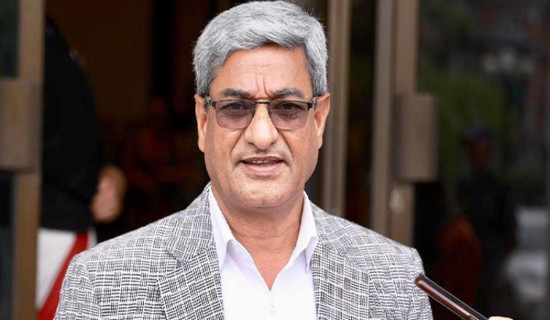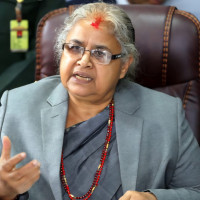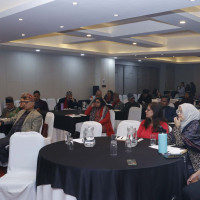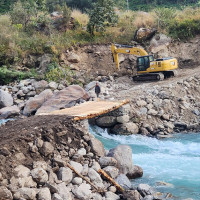- Thursday, 25 December 2025
House session focuses on Bills of urgency: Speaker
With the beginning of the winter session of the parliament, Devraj Ghimire, Speaker of the House of Representatives of Nepal, has shared his confidence that this session is going to be the more effective than the previous ones. In an insightful conversation with Pallav Bhusal of The Rising Nepal and a team of its sister publications Gorkhapatra daily, Gorkhapatra online and Gorkhapatra TV, Ghimire shared his views on the upcoming parliamentary session, its key legislative challenges and his efforts to ensure a smooth and effective parliamentary process.
What are the main agendas for the upcoming winter parliamentary session ?
The primary focus will be on presenting, discussing, and passing ordinances, Acts, and Bills introduced by parliamentary committees and the government. The winter session is often called the "Bills session," as it prioritises the approval of essential legislation based on urgency and national importance.
What are the key legislative issues that the Parliament needs to address?
The most pressing legislative issue is the Civil Service Act, which is crucial for the smooth operation of the federal system. The Bill has been under discussion for three years, and without it, the three-tier government structure struggles due to a lack of officers and administrative resources.
Additionally, the School Education Act Bill needs to be passed to ensure quality education and the proper functioning of schools. The Police Act is another priority, as it will streamline law enforcement management and enhance operational efficiency.
How are government ordinances implemented?
The government has introduced six ordinances across various sectors to improve public services. By law, these ordinances must be passed by Parliament within 60 days of their announcement. Some replacement Bills will also be introduced alongside these ordinances for further discussion and approval.
What steps have you taken to make Parliament more effective and freer from controversy ?
Parliament was inactive for nearly five months, limiting discussions to parliamentary committees. While disagreements and debates are natural in a democratic institution, they should be constructive rather than perceived as conflicts. For Parliament to be effective, lawmakers must work within a structured system and remain focused on legislative objectives.
I hope all political parties recognise the importance of constructive dialogue and learn from past mistakes to make Parliament more efficient and result-oriented.
How does the lack of consensus and dialogue between political parties affect Parliament’s functioning ?
Dialogue between parties typically happens when specific issues arise. Sometimes, negotiations involve compromises to resolve differences, but continuous engagement is unnecessary unless there is a pressing matter at hand.
What initiatives have you taken to ensure an obstruction-free Parliament ?
I have been engaged in consultations with parliamentary leaders across party lines to ensure smooth proceedings. Open discussions and mutual understanding are essential to preventing unnecessary disruptions. Moving forward, we need to address issues systematically to avoid prolonged deadlocks.
What is the Speaker's role in strengthening the relationship between the Parliament and the executive ?
The government is formed through Parliament and is accountable to it, but the reverse is not true. The executive must address Parliament’s concerns and ensure smooth legislative operations. Both institutions should work collaboratively, maintaining a spirit of mutual support to resolve issues efficiently.
What new initiatives are being taken to connect Parliament with the people?
Lawmakers represent the people and carry the responsibility of addressing their concerns. Issues affecting citizens must be brought to Parliament, debated, and resolved effectively. For instance, when the problem of loan sharks became widespread, a parliamentary committee was formed to address the issue. If the Parliament functions properly, such concerns can be discussed and resolved systematically.
There is room for improvement in how Parliament, the executive, and the judiciary operate. We must move forward in an organized and methodical manner, and I am committed to implementing these improvements.
How do you manage disputes and debates in parliamentary meetings?
There must be a shared understanding among lawmakers and political parties. I believe our legislators are becoming more mature and responsible, and the political system is evolving accordingly. The upcoming winter session will be more effective than previous ones, focusing on real issues that impact people’s lives.
I have already engaged with both ruling and opposition party members to ensure productive discussions. A parliamentary calendar will be strictly followed to ensure attendance and meaningful deliberations. Previously, there were complaints about absenteeism among lawmakers, but adhering to the calendar will ensure key issues are addressed properly.
What is your view on the constructive role of opposition parties ?
I have spoken with opposition leaders, and they have expressed their willingness to participate actively in the upcoming session. The opposition plays a crucial role in keeping the government accountable, and I am confident they will fulfill this responsibility effectively.
What steps should Parliament take to address Nepal’s economic crisis ?
Currently, there is no specific economic agenda for the upcoming session, but economic issues should undoubtedly be discussed in Parliament. Finding viable solutions to the country’s financial challenges is a priority, and I expect this issue to be raised during parliamentary sessions.
Why have parliamentary committees been slow in finalizing bills ?
The speed at which bills move forward depends on lawmakers’ sense of responsibility. Delays often stem from technical challenges, the absence of key ministers during committee meetings, or a lack of urgency. Such issues must be resolved to ensure the timely completion of legislative work. Passing bills and ordinances is our primary duty, and all political parties must work together rather than engage in unnecessary disputes. Government ministers and parliamentary leaders must also be proactive in ensuring legislative progress.
A lack of deadlines for committee work contributes to inefficiency, but at the same time, the absence of necessary laws hampers smooth operations. This is an area that needs serious attention.
If the House does not follow its agenda, what challenges arise?
Before each session, a parliamentary calendar is set, but unexpected national events often take priority, disrupting pre-planned agendas. Unfortunately, this trend has sidelined important discussions. I am committed to changing this practice so that House proceedings are not merely ceremonial but result-oriented.
There are complaints that the Q&A sessions with the Prime Minister and ministers are just a formality. Can they be made more effective ?
Introducing these Q&A sessions was a significant step in itself, as they were not a regular feature in previous parliamentary practices. Before considering procedural changes, we should focus on making these sessions more substantive and regular.
It is often said that a strong government dominates the House. What is your experience?
A majority party naturally forms the government and wields influence, but I have not observed excessive dominance in parliamentary affairs.
There was a question regarding the impartiality of the Speaker in the past. Can a balanced approach be maintained ?
I can confidently say that I do not work under the influence of any political party. As Speaker, I have always operated within the system, addressing issues fairly and impartially. Over the years, I have seen all major political parties take turns in government and opposition, and I have always worked with all sides to resolve parliamentary issues efficiently.
















